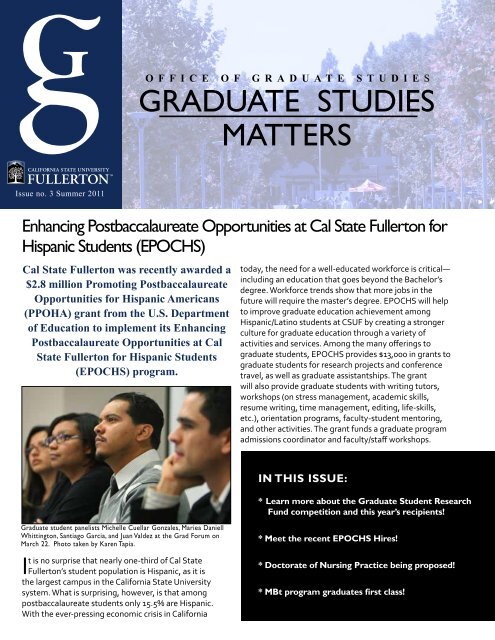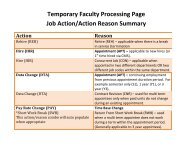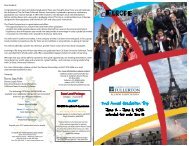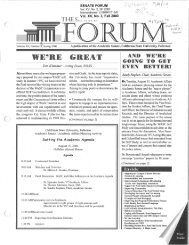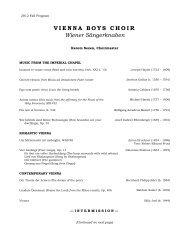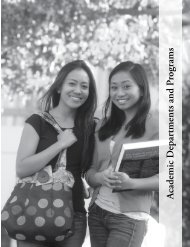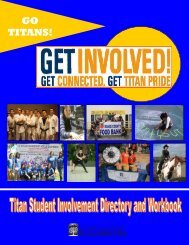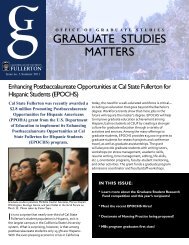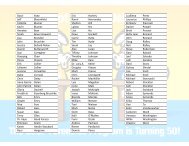GRADUATE sTUDiEs mATTERs - California State University, Fullerton
GRADUATE sTUDiEs mATTERs - California State University, Fullerton
GRADUATE sTUDiEs mATTERs - California State University, Fullerton
You also want an ePaper? Increase the reach of your titles
YUMPU automatically turns print PDFs into web optimized ePapers that Google loves.
Issue no. 3 Summer 2011<br />
Cal <strong>State</strong> <strong>Fullerton</strong> was recently awarded a<br />
$2.8 million Promoting Postbaccalaureate<br />
Opportunities for Hispanic Americans<br />
(PPOHA) grant from the U.S. Department<br />
of Education to implement its Enhancing<br />
Postbaccalaureate Opportunities at Cal<br />
<strong>State</strong> <strong>Fullerton</strong> for Hispanic Students<br />
(EPOCHS) program.<br />
Graduate student panelists michelle Cuellar Gonzales, mariea Daniell<br />
Whittington, santiago Garcia, and Juan Valdez at the Grad Forum on<br />
march 22. Photo taken by Karen Tapia.<br />
It is no surprise that nearly one-third of Cal <strong>State</strong><br />
<strong>Fullerton</strong>’s student population is Hispanic, as it is<br />
the largest campus in the <strong>California</strong> <strong>State</strong> <strong>University</strong><br />
system. What is surprising, however, is that among<br />
postbaccalaureate students only 15.5% are Hispanic.<br />
With the ever-pressing economic crisis in <strong>California</strong><br />
OFFICE OF <strong>GRADUATE</strong> STUDIES<br />
<strong>GRADUATE</strong> <strong>sTUDiEs</strong><br />
<strong>mATTERs</strong><br />
Enhancing Postbaccalaureate Opportunities at Cal state <strong>Fullerton</strong> for<br />
Hispanic students (EPOCHs)<br />
today, the need for a well-educated workforce is critical—<br />
including an education that goes beyond the Bachelor’s<br />
degree. Workforce trends show that more jobs in the<br />
future will require the master’s degree. EPOCHS will help<br />
to improve graduate education achievement among<br />
Hispanic/Latino students at CSUF by creating a stronger<br />
culture for graduate education through a variety of<br />
activities and services. Among the many offerings to<br />
graduate students, EPOCHS provides $13,000 in grants to<br />
graduate students for research projects and conference<br />
travel, as well as graduate assistantships. The grant<br />
will also provide graduate students with writing tutors,<br />
workshops (on stress management, academic skills,<br />
resume writing, time management, editing, life-skills,<br />
etc.), orientation programs, faculty-student mentoring,<br />
and other activities. The grant funds a graduate program<br />
admissions coordinator and faculty/staff workshops.<br />
IN THIS ISSUE:<br />
* Learn more about the Graduate Student Research<br />
Fund competition and this year’s recipients!<br />
* Meet the recent EPOCHS Hires!<br />
* Doctorate of Nursing Practice being proposed!<br />
* MBt program graduates first class!
GRAD sTUDENT REsEARCH FUND<br />
RECiPiENTs<br />
FROm lEFT TO RiGHT: EVAN sENN, Amy sTEFFEs, ANTHONy<br />
RODRiGUEz & ERiN ARRUDA<br />
Thanks to the U.S. Dept of Education’s recent grant<br />
to Office of Graduate Studies, CSUF now offers<br />
grant money to graduate students to support their<br />
research and conference travel.<br />
The EPOCHS Graduate Student Research Fund has<br />
already awarded nearly $16,000 to fifty graduate<br />
students in American Studies, Anthropology, Art,<br />
Biology, Business Administration, Chemistry, Civil<br />
Engineering, Education, Electrical Engineering,<br />
English, Environmental Studies, Geology, History,<br />
Kinesiology, Political Science, Psychology, Public<br />
Administration, Public Health, and Sociology.<br />
The deadlines are monthly, throughout each<br />
semester. The amount of money awarded ranges,<br />
depending on the proposed project and/or research<br />
needs, but usually runs between $200 and $400.<br />
Money awarded must be for research and/or travel<br />
to conferences to present research (and will not<br />
be awarded for tuition, fees, or course books). The<br />
application process is easy and there is no reason<br />
why anybody should let an opportunity like this pass<br />
them by.<br />
To apply, see Office of Graduate Studies website:<br />
www.fullerton.edu/graduate<br />
AWARDED sTUDENTs<br />
January<br />
Amy Steffes<br />
Andrew Wright<br />
Anthony Rodriguez<br />
Erin H. Arruda<br />
Evan A. Senn<br />
Jeffery M. Hunger<br />
Justin Myrick<br />
Randolph D. Hubach<br />
Yi Zhao<br />
February<br />
Constance Baroudos<br />
Laura Elsberry<br />
Julie Yang<br />
Ryan Russell Hunt<br />
Kari Koppitch<br />
Jason Schott<br />
Rahima Schwenkbeck<br />
Charles S. Hauser<br />
Stacey Moultry<br />
John Carlos Marquez<br />
Jason Ward<br />
Joshua Korn<br />
Jorge A. Luquin<br />
James Davis<br />
Santiago Andres Garcia<br />
FAll DEADliNEs<br />
Eligibility Requirements:<br />
September 1, 2011<br />
October 17, 2011<br />
November 28, 2011<br />
March<br />
Emily Allen<br />
Erin Hilary Arruda<br />
Gavin S. Fort<br />
Maureen Fox<br />
Thomas Fujii<br />
Tara Leederman<br />
Tremonisha L. Martin<br />
Bonnie Joy Massey<br />
Kyle Newton<br />
Anthony Rodriguez<br />
Alisa Spieckerman<br />
Allison Town<br />
Phillip Matthew Trad<br />
Jonathon Wiener<br />
April<br />
Andres Carrillo<br />
Leticia Chacon-Arias<br />
Marilyn Cruz<br />
Karla Flores<br />
Brianne Levine<br />
Samantha Marin<br />
Rebecca Medina<br />
Catalina Olvera<br />
Michael Perez<br />
Manely Rashedan<br />
Burrel Vann Jr.<br />
Melissa Warstadt<br />
1. Applicants must be currently enrolled in a<br />
graduate degree program at CSUF, and must be in<br />
good academic standing.<br />
2. Applicants must have filed a FAFSA application<br />
and have a demonstrated financial need.<br />
3. Must submit a completed application to Office<br />
of Graduate Studies, along with a letter of<br />
recommendation from a faculty member.
BECAs DE iNVEsTiGACiON PARA<br />
EsTUDiANTEs EN POsGRADO<br />
Gracias al Departamento de Educación<br />
Estadounidense, CSUF ahora ofrece becas<br />
a estudiantes de posgrado para financiar<br />
investigaciones académicas y viajes a conferencias.<br />
Hasta hoy el fondo de Investigaciones de<br />
Estudiantes Posgrado EPOCHS ha otorgado<br />
casi $16, 000 a cincuenta estudiantes de los<br />
departamentos de Estudios Americanos,<br />
Antropología, Arte, Biología, Administración de<br />
Negocios, Química, Ingeniería Civil, Ingles, Estudios<br />
del Ambiente, Geología, Historia, Kinesiología,<br />
Ciencia Política, Psicología, Administración Publica,<br />
Salud Publica, y Sociología.<br />
TUTORs- New Program in ULC--JUST FOR GRADS!<br />
HELEN ALExANDER<br />
Helen Alexander<br />
has a B.A. in English<br />
Language and Literature<br />
and a B.A. in French.<br />
She received her M.S.<br />
Ed. TESOL from CSUF,<br />
and also completed a<br />
Postsecondary Reading<br />
and Learning Certificate,<br />
which qualifies her to teach college-level reading,<br />
study skills, and critical thinking courses. She has<br />
taught an upper division writing course for the<br />
Modern Languages Department, has developed a<br />
critical thinking course curriculum specifically geared<br />
to meet the needs of ESOL students seeking to<br />
continue their education at an American university,<br />
and currently teaches for the intensive English<br />
program on campus, the American Language<br />
Program. Her liberal arts background, pedagogical<br />
training, and years of experience that include being<br />
a grad student, a writer both creatively and in her<br />
professional field, and a teacher of writing afford her<br />
a unique relationship to the written word and the<br />
ability to pin-point how it can enrich, or detract from,<br />
the author’s intended meaning.<br />
Cada semestre tiene plazos mensuales. La<br />
cantidad de dinero otorgado depende del proyecto<br />
propuesto y/o las necesidades de la investigación,<br />
pero usualmente es alrededor de $200 a $400. El<br />
dinero debe ser para investigaciones y/o viajes a<br />
conferencias para presentar investigaciones (y no<br />
será otorgado para pagar clases, cuotas o libros).<br />
La aplicación es simple y cada estudiante posgrado<br />
es elegible, y no hay ninguna razón porque alguien<br />
debería dejar pasar esta oportunidad.<br />
The <strong>University</strong> Learning Center is now the home to two new Graduate Learning Specialists. In addition to<br />
one-on-one tutoring, the Specialists will be offering workshops designed to meet the extended needs of any<br />
and all graduate students. The two new Specialists, Helen Alexander and Gerardo Arellano, are available<br />
for walk-in appointments as well as workshops Monday through Thursday, 4pm-8pm.<br />
All workshops will be held in H-516.<br />
Visit www.fullerton.edu/ulc or call 657-278-8629 for more information.<br />
GERARDO ARELLANO<br />
Gerardo completed his<br />
undergraduate studies<br />
in Comparative Ethnic<br />
Studies at UC San<br />
Diego. While at UCSD<br />
he was a Ronald E.<br />
McNair scholar, student<br />
activist, and co-founder<br />
of Spiderwebs (i.e. a<br />
multicultural student zine). Gerardo went on to<br />
receive his M.A. and Ph.D. from UC Berkeley in<br />
Ethnic Studies. As a true inter-disciplinarian, he<br />
currently researches and publishes in the areas of<br />
human rights, U. S. immigration policy, Latina/o<br />
subcultures, border studies, music, historical blocs,<br />
and subaltern movements. Equally important to<br />
his breadth as a scholar is his love for teaching.<br />
Gerardo believes in critical pedagogy and teaches<br />
at different universities in Southern <strong>California</strong>.<br />
Some classes that he teaches are Critical Race<br />
Theory and Marxism at UC Riverside. He also<br />
teaches Chicana/o and Latina/o history for the<br />
department of Chicana/o Studies at UC Irvine. He<br />
teaches history courses for the Chicana/o studies<br />
department at CSU <strong>Fullerton</strong>.
TERTUliA<br />
Tertulia is a Spanish word that describes a social and<br />
cultural gathering of like-minded intellectuals and creative<br />
types. Tertulias originally started as a type of Spanish<br />
literary salon that was popular in Spain from at least the<br />
17th century, and eventually replaced the more formal<br />
academies. Tertulias were held in private homes at first,<br />
but in the early 19th century they met in clubs and cafes.<br />
Cal <strong>State</strong> <strong>Fullerton</strong>’s recent Tertulia was met with open<br />
arms as dozens of creatives and intellectuals gathered<br />
in the Clayes Performing Arts Theater ready to engage in<br />
intelligent conversations, activities, and debates. There<br />
were performances by a classical quartet, poetry readings,<br />
and even live painting by Kevin Stewart-Magee, MFA<br />
student in Painting and Drawing.
“[My mentor]<br />
consistently goes beyond what<br />
can be expected from a professor-<br />
truly, she is a mentor by nature. ... Her<br />
passion for student success does not limit itself<br />
to just me. ... Just recently, at the ... Tertulia,<br />
she invited a student from an entirely different<br />
department to sit in on our advertising discussion.<br />
... [This] student has since guest attended lectures<br />
in the Communications department [and] ... [as a]<br />
result of ... [my mentor’s] introduction ... may attain<br />
an internship. [My mentor] ... regularly motivates<br />
people to shun their fears! She encourages people<br />
to think outside of the box, pushes them to<br />
pursue goals and facilitates relationships<br />
that make opportunities possible!” -<br />
A female CSUF M.A. student<br />
(Communication)<br />
“Having [her] ...<br />
as my mentor has helped<br />
me develop not only career<br />
wise, but also as an individual.<br />
She was able to advise me on what<br />
classes I should take and more<br />
importantly, she provided me with<br />
resources that will help me succeed<br />
in the future as a high school<br />
teacher.” - A Hispanic female<br />
CSUF Credential student<br />
(Mathematics)<br />
This spring CSUF launched a Faculty-Graduate Student<br />
Mentoring Program. Twenty-five faculty members<br />
from our eight colleges formed the first cohort. As<br />
research emphasizes that mentors need to take into<br />
account differences in culture, ethnicity, and gender,<br />
our mentors received training on a wide range of issues<br />
pertaining to diversity, designed a training curriculum,<br />
and interacted with one another and graduate students<br />
at a “Tertulia” event which featured live performances.<br />
FACUlTy mENTORs<br />
“Exploring<br />
opportunities with ...<br />
[my mentor] encouraged me<br />
throughout the process. Most<br />
importantly, my focus is much<br />
clearer with his shared perspective<br />
and for that I am eternally grateful.<br />
Now, I am the first to graduate with<br />
a Master’s degree in my entire<br />
family.” - A Hispanic female<br />
CSUF Credential student<br />
(Mathematics)<br />
“[My mentor has]<br />
provided valuable advice<br />
and support. He suggested, and<br />
even persuaded me, to apply for the<br />
M.A. program in Spanish. ... Before<br />
entering the program I had the opportunity<br />
to prepare myself with readings and literary<br />
criticism suggested by my mentor. ... Having<br />
someone to guide me was fundamental in my<br />
success. Not only have I completed my M.A.<br />
program successfully, but I developed<br />
a marvelous interest and passion<br />
for Spanish and Latin American<br />
literature.” - A Hispanic male<br />
CSUF M.A. student<br />
(Spanish)
mBT PROGRAm <strong>GRADUATE</strong>s<br />
iTs FiRsT ClAss iN 2011!<br />
The Master of Biotechnology (MBt) is a new<br />
graduate degree program offered at CSUF since Fall<br />
2009. The degree is overseen by CSU’s Program for<br />
Applied Biotechnology Studies (PABS) and is offered<br />
through a consortium of three CSU campuses:<br />
<strong>Fullerton</strong>, Los Angeles, and Pomona. The MBt is a<br />
“professional master’s degree” and as such provides<br />
not only a thorough training in science skills<br />
fundamental to industry, but also those skills vital<br />
to business; included in the curriculum are project<br />
and team management, cross-functional teamwork,<br />
group leadership and communication, regulatory<br />
affairs, drug discovery and development, and stem<br />
DOCTORATE iN NURsiNG PRACTiCE<br />
BEiNG PROPOsED<br />
In the past few years, CSUF has made great<br />
improvements and expansions to its School of<br />
Nursing, which now boasts about 900 majors<br />
making it one of the largest nursing schools in<br />
the Cal <strong>State</strong> <strong>University</strong> system. Some of those<br />
improvements included nursing degree programs<br />
for students who do not have a background in<br />
nursing leading to a Bachelor of Science in Nursing<br />
as well as a Master of Science in Nursing. Within<br />
the master’s program, concentrations have been<br />
expanded to include women’s health care with<br />
nurse practitioner and midwifery emphases, school<br />
nursing, and nurse educator. CSUF is proposing to<br />
offer a Doctorate of Nursing Practice (DNP) starting<br />
in Fall 2012.<br />
With the approval of the Assembly Bill 867 a few<br />
months ago, CSUF became one of three <strong>California</strong><br />
<strong>State</strong> Universities to offer the DNP as a practice<br />
pilot program. CSUF will partner with Long Beach<br />
<strong>State</strong> and CSU Los Angeles to offer the program<br />
jointly; another will be offered jointly by Fresno and<br />
San Jose; and San Diego <strong>State</strong> will have the third<br />
DNP pilot program.<br />
The DNP is distinguished from the PhD in that<br />
it integrates research and practice; the Cal<br />
<strong>State</strong> <strong>University</strong> DNP curriculum will also have<br />
courses in pedagogy. <strong>California</strong> hopes that the<br />
newly implemented nursing program will help<br />
decrease the nursing shortage. By 2015, all nurse<br />
practitioners, nurse anesthetists, clinical nurse<br />
cell methodology. The degree prepares graduates<br />
for careers in biomedical device, biocomputing, and<br />
biopharmaceutical industry. As part of the two-year<br />
degree, students intern with leading biotechnology<br />
and biomedical device companies in Southern<br />
<strong>California</strong>. Offering the program over three<br />
universities allows students to benefit from faculty<br />
expertise and learning resources at all campuses;<br />
each campus will offer at least one core course and<br />
one set of advanced courses.<br />
For more information, visit: http://biology.fullerton.<br />
edu/PABS/<br />
specialists, and nurse midwives will all have to<br />
achieve a doctorate degree to become licensed,<br />
according to nursing accreditation standards. This<br />
new level of required education amongst our nurses<br />
and in our hospitals can only benefit our health<br />
care system in <strong>California</strong>, raising the bar in medical<br />
practice. In addition, nurses with the DNP will be<br />
qualified to teach within a college or university.<br />
By 2015, all nurse practitioners, nurse<br />
anesthetists, clinical nurse specialists,<br />
and nurse midwives will all have<br />
to achieve a doctorate degree to<br />
become licensed, according to nursing<br />
accreditation standards.<br />
Photo taken by Karen Tapia.
CsUF GETs iTs FiRsT NsF FEllOW!<br />
Photo of Beena Ajmera. Taken by mimi Ko Cruz<br />
The National Science Foundation (NSF) Graduate<br />
Research Fellowship Program (GRFP) has an<br />
extensive history in science and engineering<br />
education, and is the oldest fellowship of its kind.<br />
GRFP, widely considered the most competitive<br />
fellowship program for any master’s or doctoral<br />
student, supports extraordinary graduate students<br />
pursuing research-based master’s and doctoral<br />
degrees. Recipients of this fellowship have a<br />
reputation for becoming important contributors<br />
within their field of study. Past fellows include<br />
numerous Nobel Prize winners, U.S. Secretary of<br />
Energy Steven Chu, Google founder Sergey Brin, and<br />
Freakonomics co-author Steven Levitt.<br />
Beena Ajmera, who earned her Bachelor of Science<br />
in Civil Engineering in Spring 2011, has honored<br />
CSUF with being the first enrolled NSF fellow in the<br />
history of this university. An undergraduate, Beena<br />
trumped over master’s and doctoral students from<br />
all over the country to win this fellowship. She will<br />
receive an annual stipend of $30,000 for three years,<br />
and a $10,500 cost-of-education allowance. This<br />
support will help Ajmera continue her research, and<br />
fund her master’s degree as well as her doctoral<br />
program, according to Dr. Mallela Prasada Rao,<br />
chair of the Department of Civil Engineering at<br />
CSUF. Dr. Prasada Rao notes that Ajmera plans on<br />
finishing her masters in one year, and will spend the<br />
last two years–with help from the NSF fellowship<br />
award–in her doctoral program at Virginia Tech.<br />
Ajmera won the GRFP because of her diligent<br />
research, now more than a year, on water-saturated<br />
slopes of various types of soil and their strength<br />
under the weight of large buildings or housing<br />
developments. She says, “I am working on how the<br />
strength of a soil changes with the construction<br />
of a building or during an earthquake. I also am<br />
working on an environmental-friendly ground<br />
modification technique using saline water,” she<br />
said. Ajmera also won first place in the American<br />
Society of Civil Engineers Geo-Institute’s first<br />
national student poster competition in Florida for<br />
the same research. “Right from the beginning, Dr.<br />
Tiwari encouraged me to use the equipment in the<br />
labs. His confidence in me was inspiring.” The NSF<br />
GRFP allows the student to attend any accredited<br />
U.S. institution for his/her degree, and it certainly<br />
speaks highly of CSUF’s civil engineering program<br />
that Ajmera chose this program above all others.<br />
Dr. Prasada Rao says that this may be in part thanks<br />
to her mentor Dr. Binod Tiwari, who has helped<br />
her throughout her undergraduate education,<br />
and throughout her research for her project and<br />
application process. Dr. Tiwari, assistant professor<br />
of civil and environmental engineering and Ajmera’s<br />
faculty adviser, said he “couldn’t contain his tears<br />
when her name was called at the competition.”<br />
Dr. Prasada Rao hopes that this award will help<br />
encourage students and faculty to take advantage<br />
of opportunities like this one, and will help people<br />
to recognize the quality of education that CSUF has<br />
to offer.<br />
Beena has received multiple awards and honors<br />
since attending CSUF. Some of her honors include:<br />
• Group Scholarship recipient, Los Angeles Section,<br />
Geotechnical Engineering 2011<br />
• Second place, Pacific South West, American Society<br />
of Civil Engineers 2011<br />
• First place (Women in Science), 22nd annual Science<br />
Conference 2011<br />
• Third place, GeoFrontiers 2011<br />
• Ranked number one in the nation, GeoChallenge<br />
Student Competition 2011<br />
• Dwight D. Eisenhower Transportation Fellowships<br />
2009 and 2010<br />
• First place, <strong>California</strong> <strong>State</strong> <strong>University</strong> Student<br />
Research Competition 2010<br />
• Second place, Orange County, American Society of<br />
Civil Engineers scholarship 2010<br />
• First place, National Student Research Poster<br />
competition 2010
sTUDENTs sPEAK OUT ON issUEs OF<br />
<strong>GRADUATE</strong> DiVERsiTy<br />
by Jessica Ordaz , American Studies Graduate Student<br />
I heard about the Office of Graduate Studies<br />
receiving the U.S. Dept. of Education’s grant<br />
Promoting Postbaccalaureate Opportunities for<br />
Hispanic Americans at the 2010 Chicano/Latino<br />
Faculty and Student Scholarship dinner. President<br />
Gordon described the low number of Chicano/Latino<br />
students with a graduate degree (2% in <strong>California</strong>)<br />
and laid out the importance of the grant 1 . Knowing<br />
what it is to be a woman of color in graduate school,<br />
I was excited to hear that more resources would<br />
be given for outreach and retention of Latina/o<br />
graduate students. The grant, called EPOCHS at<br />
CSUF, makes essential steps to create a culture for<br />
postbaccalaureate education. Currently, only 15.5%<br />
of postbaccalaureate students at CSUF are Chicano/<br />
Latino. In order to better ensure CSUF continues to<br />
be an accessible institution for students of all socioeconomic<br />
backgrounds, a conversation addressing<br />
specific experiences of students of color in academia<br />
is needed.<br />
Much of the research conducted on Chicano/Latino<br />
students points to a number of obstacles in pursuing<br />
higher education: “social integration, language<br />
barriers, lack of cultural capital, racism, lack of<br />
educational leadership, impersonal educational<br />
environments, low teacher expectations, insufficient<br />
parental support, negative peer pressure, lack<br />
of mentors, and financial shortfalls.” 2 The more<br />
I discuss educational experiences with other<br />
students, the more important I find the abovementioned<br />
factors.<br />
I moved to <strong>Fullerton</strong> during summer 2009 to enter<br />
the M.A. American Studies program. I was excited<br />
to pursue a graduate degree, something only one<br />
other person in my entire extended family has done.<br />
My parents are both immigrants from Michoacán,<br />
Mexico and were campesinos most of their lives.<br />
Although they were supportive and proud of my<br />
educational accomplishments, they did not have the<br />
tools to guide me in pursuing higher education. One<br />
of the largest challenges in my graduate education<br />
is the physical distance between my family and<br />
I (they live outside San Francisco); however,<br />
regardless of the distance between a student and<br />
family, feelings of isolation are echoed by a majority<br />
of Chicano/Latino graduate students. A Latino Policy<br />
and Issues brief asserts, “Chicana/o students often<br />
describe graduate school as a place where they<br />
feel invisible—like outsiders or imposters…. They<br />
experience racial and gender microaggressions,<br />
lowered academic expectations from faculty, and<br />
pressure to be the spokesperson for all Chicana/<br />
os or People of Color. Such experiences cause<br />
many Chicana/os to doubt their academic abilities,<br />
question the value of their scholarly contributions,<br />
and reconsider their decision to pursue a graduate<br />
degree.” 3 Part of the isolation that many students<br />
experience is due to distance from family, lack of<br />
support and resources, and inability to connect with<br />
students who share their own world view.<br />
A former CSUF student (choosing to remain<br />
anonymous) describes her experience as something<br />
she “survived”—a revealing testimony as ones<br />
graduate experience should be empowering.<br />
Testimonies such as these affirm the need to create<br />
a more accessible, culturally sensitive, and enriching<br />
environment. One solution to facilitate student<br />
interaction is to create spaces where students can<br />
share their research with the larger student body,<br />
for example, a colloquium that exhibits student<br />
research from all fields and contributes to the<br />
Chicano/Latino community.<br />
Opportunities for students of color to network with<br />
one another are necessary to develop a stronger<br />
system of support and in turn minimize feelings<br />
of isolation. In addition, more guidance from<br />
administrators and faculty is needed to ensure<br />
first-generation college students have adequate<br />
support. CSUF is a diverse campus—to ensure that<br />
students from all backgrounds, identities, and<br />
generational status have opportunity to pursue and<br />
succeed in graduate school, a strong climate for<br />
graduate education needs to be strengthened and<br />
developed. I am excited EPOCHS can contribute to<br />
this foundation for students at CSUF.<br />
1 Leo Estrada, Latino Issues Forum (2009).<br />
2 Manuel Emilio, E.d.D diss., Florida International <strong>University</strong>, 2009, 6.<br />
3 Daniel G. Solorzano and Tara J. Yosso, Latino Policy (2006).
Durante la cena de Asociación Chicano/Latino para<br />
Facultad en el 2010, escuche que el departamento<br />
de Educación le había otorgado a la oficina<br />
de estudios posgrado la subvención PPOHA -<br />
Promoting Postbaccalaureate Opportunities for<br />
Hispanic Americans (Promoviendo oportunidades<br />
de pos bachillerato a Hispano Americanos). El<br />
Presidente Gordon hablo sobre el bajo porcentaje de<br />
estudiantes Chicanos/Latinos en estudios posgrado<br />
(2% en <strong>California</strong>) y discutió la importancia de la<br />
subvención1. Como mujer y estudiante Latina,<br />
me alegro escuchar que más recursos se crearían<br />
para asistir con la retención de Latinos en estudios<br />
posgrado. La subvención ha creado el programa<br />
EPOCHS y está tomando pasos esenciales para crear<br />
una cultura de campus para la educación posgrado.<br />
En este momento, solo 15.5% de estudiantes<br />
posgrados en CSUF son Chicano/Latino. Para<br />
mejor entender estas estadísticas y asegurar que<br />
CSUF continúe siendo una institución accesible, es<br />
necesaria una conversación sobre las experiencias<br />
específicas de estudiantes de color en la academia<br />
La mayor parte de investigaciones sobre la<br />
educación de estudiantes Chicanos/Latinos,<br />
señalan varios obstáculos en seguir una educación<br />
avanzada; “integración social, barreras de idioma,<br />
falta de capital cultural, racismo, falta de liderazgo<br />
educativo, ambientes educativos no adecuados,<br />
maestros con bajas expectativas, no tener suficiente<br />
apoyo de los padres, presión social negativa,<br />
falta de mentores, y déficit financiero.”2 Entre<br />
más discuto experiencias educativas con mis<br />
colegas, encuentro que estos factores son de gran<br />
importancia.<br />
Yo me transferí a <strong>Fullerton</strong> durante el verano<br />
del 2009 después de ser admitida al programa<br />
de posgrado en Estudios Americanos. Fue muy<br />
emocionante continuar mis estudios posgrado ya<br />
que es algo que solo otro miembro de mi familia<br />
a logrado hacer. Mis padres son inmigrantes de<br />
Michoacán, México y fueron campesinos la mayor<br />
parte de sus vidas. Aunque me apoyaron y están<br />
orgullosos de mí, no tenían las herramientas para<br />
dirigirme en perseguir una educación más alta. Uno<br />
de los desafíos más grandes en mi estudio postrado<br />
es la distancia física entre mi familia y yo (ellos<br />
viven afuera de San Francisco); sin embargo, aunque<br />
estudiantes tengan cerca a su familia, la mayoría de<br />
EsTUDiANTEs HABlAN sOBRE<br />
DiVERsiDAD EN POsGRADO<br />
por Jessica Ordaz , Estudiante Posgrado en Estudios Americanos<br />
estudiantes Chicano/Latino tienen experiencias de<br />
aislamiento. La publicación, Leyes y Temas Latinos,<br />
afirma, “los estudiantes Chicana/o describen sus<br />
estudios posgrado como un tiempo cuando se<br />
sintieron invisibles-como intrusos o impostores….<br />
Sus experiencias incluyen micro agresiones raciales<br />
y de género, expectativas bajas de la facultad, y<br />
presión de ser la portavoz de Chicana/os o Personas<br />
de Color. Estas experiencias causan a Chicana/os<br />
que duden sus habilidades académicas, el valor de<br />
sus contribuciones escolásticas y que reconsideren<br />
sus decisiones de seguir sus estudios posgrado.” 3<br />
Parte del aislamiento que sienten se debe a la<br />
distancia de la familia, falta de ayuda y recursos,<br />
e inhabilidad de conectar con estudiantes que<br />
comparten su visión del mundo.<br />
Una alumna anterior de CSUF (quien quiso<br />
mantenerse anónima) describe su experiencia<br />
como algo que ella “sobrevivió”—una revelación<br />
porque la experiencia posgrado debería empoderar.<br />
Testimonios como éstos afirman la necesidad de<br />
crear un ambiente más accesible y cultural en CSUF.<br />
Una posible solución para facilitar la interacción<br />
entre estudiantes es crear espacios donde puedan<br />
compartir sus investigaciones. Por ejemplo, un foro<br />
puede ser creado para que se discutan los temas que<br />
contribuyen a la comunidad Chicana/Latina.<br />
Oportunidades para que estudiantes de color<br />
se conozcan e interactúen son necesarias para<br />
desarrollar un sistema de ayuda sólido y reducir<br />
las experiencias de aislamiento por que pasan los<br />
estudiantes. Además, más orientación y dirección<br />
de los administradores y de la facultad es necesaria<br />
para asegurar que los estudiantes tengan acceso<br />
a información adecuada sobre estudios posgrado.<br />
CSUF es un campus diverso y para asegurar<br />
que estudiantes de todas identidades y de cada<br />
generación tengan la oportunidad de seguir con<br />
estudios posgrado, un ambiente inclusivo tiene<br />
que desarrollarse. Estoy alegre que EPOCHS<br />
ha comenzado a crear esta fundación para los<br />
estudiantes de CSUF.<br />
1 Leo Estrada, Latino Issues Forum (2009).<br />
2 Manuel Emilio, E.d.D diss., Florida International <strong>University</strong>, 2009, 6.<br />
3 Daniel G. Solorzano and Tara J. Yosso, Latino Policy (2006).
Ed.D. PROGRAm FlOURisHEs!<br />
In 2005, the <strong>State</strong> of <strong>California</strong> passed legislation<br />
allowing Cal <strong>State</strong> <strong>University</strong> campuses to offer the<br />
first doctorate, Ed.D. in Educational Leadership.<br />
CSUF was one of seven “first wave” campuses<br />
that started programs in the fall of 2007; CSUF<br />
first cohort had 18 students in the PreK-12<br />
Leadership concentration. Fall 2008 and Fall 2009<br />
cohorts were started in both the PreK-12 and the<br />
Community College concentrations, and there are<br />
now 91 total students in the Ed.D. program. The<br />
Ed.D. is a 60-unit, three-year degree program for<br />
mid-career professionals that requires that the<br />
entering students already have a master’s degree in<br />
education or a closely related field.<br />
“The mission of the Ed.D. Program<br />
is to prepare informed and reflective<br />
educational leaders”<br />
-Department of Educational Leadership, CSUF<br />
The Department of Educational Leadership states<br />
that “The mission of the Ed.D. program is to prepare<br />
informed and reflective educational leaders who<br />
ethically apply critical skills of evaluation, analysis,<br />
synthesis, and action to ensure excellence and<br />
equity in educational practice as they serve as<br />
2ND ANNUAl GRAD FORUm<br />
Workshops covered financial aid in many forms,<br />
the graduate student experience, and all the<br />
possibilities and requirements of higher education<br />
goals even beyond graduate school.<br />
The Pollak Library was taken over by swarms of<br />
academically driven people on March 22 at Cal <strong>State</strong><br />
<strong>Fullerton</strong>’s second annual Graduate Forum. This<br />
year’s theme was Diversity & Graduate Education.<br />
The Forum, an all day event, encompassed all<br />
aspects of graduate education, while highlighting<br />
the benefits of diversity. The Forum covered<br />
many facets of diversity in this particular area of<br />
education, including cultural diversity, diverse<br />
areas of interest and study, different programs and<br />
resources for higher education offered at Cal <strong>State</strong><br />
<strong>Fullerton</strong> as well as other universities, and many<br />
diverse first-hand accounts of the graduate student<br />
experience.<br />
In preparation for the full day of events for the<br />
Graduate Forum, the Office of Graduate Studies<br />
also offered graduate student workshops the night<br />
before, held in the library. In a more casual setting,<br />
speakers were invited to come and work with<br />
graduate students and <strong>University</strong> professionals .<br />
stewards to the education community.“ Current<br />
Ed.D. students are working professionals from<br />
community colleges and pre-kindergarten through<br />
grade 12 schools and districts. For example, the<br />
third PreK-12 cohort, from 2009-10, includes several<br />
students who work in private schools and one<br />
who works at a charter school, a chief information<br />
officer for a school district, and an assistant<br />
superintendent for human resources. The second<br />
Community College cohort, also from 2009-10,<br />
includes a vice president of student services, a<br />
director of EOPS, two counselors, vocationaltechnical<br />
faculty, and a director of a nursing<br />
program.<br />
The Ed.D. program is governed in partnership<br />
with practitioners who are our partners and serve<br />
on our Executive Board, Admissions Committee,<br />
and Advisory Committee along with faculty. In<br />
addition, the E.d.D program has supported the<br />
launch of a new research center: Center for Research<br />
Educational Access and Leadership (C-REAL).<br />
C-REAL specializes in developing strategies to help<br />
educational access and leadership through practice,<br />
policy, and change. It is a partnership between local<br />
educational agencies, schools and colleges, and the<br />
College of Education faculty and graduate students<br />
from CSUF.<br />
The events at the Forum were packed full of<br />
speakers, guests, and students. The turn-out was<br />
impressive, and the panels were of high interest.<br />
The Student Resource Fair in the Salz-Pollak Room<br />
in the main lobby of the library held vendors poised<br />
and ready to help every student walking through.<br />
The Resource Fair highlighted not only what Cal<br />
<strong>State</strong> <strong>Fullerton</strong> had to offer grad students on their<br />
journey through higher education, but also what<br />
other institutions might have to help students<br />
looking to get into Master’s or Doctoral programs.<br />
Kaplan and Princeton Review came out to help; even<br />
CSUF’s own Grand Central Art Center came out to<br />
support the event.<br />
Read more about it at www.fullerton.edu/graduate
EPOCHs NEW HiREs<br />
NORMA RAMIREz<br />
PHD COMIC STRIP<br />
As an Administrative Support Coordinator, Norma performs a variety of<br />
administrative support tasks for the EPOCHS grant and the Office of Graduate<br />
Studies, including managing the Graduate Student Research Fund, outreach<br />
events, and orientation. She received a B.A. in Spanish Literature from <strong>University</strong><br />
of <strong>California</strong>, Irvine, a Master of Public Administration from <strong>California</strong> <strong>State</strong><br />
<strong>University</strong>, Dominguez Hills, and most recently a Master of Higher Education from<br />
the <strong>University</strong> of Washington, Seattle. Her research interests include the retention<br />
and persistence of Latinos and underrepresented students in higher education,<br />
particularly looking into the obstacles students face during their college experience,<br />
and how the college environment, as well as the external environment, has an impact<br />
on student outcomes.<br />
Chandinie Francis, comes to us with her B.A. in Psychology and Anthropology,<br />
her Master’s of Science in Social Work, and is currently entering her third year of<br />
doctoral study in the Ed.D program at USC with a concentration in Educational<br />
Psychology. Chandinie last worked as a Counselor at the Disabilities Services and<br />
Programs office at USC and has an extensive professional work history as a social<br />
worker in various organizations. She was a field instructor for graduate students,<br />
and worked as a program coordinator and therapist in the non-profit sector. She is<br />
excited to join the Office of Graduate Studies team as the Graduate Student Support<br />
Specialist and to be able to offer support and guidance to graduate students at CSUF.<br />
Chandinie will be conducting various workshops to support students such as stress<br />
management, test anxiety, leadership, and time management. She is also available for<br />
one-on-one counseling and support for graduate students and can be reached at<br />
cfrancis@fullerton.edu. Her walk-in hours in Office of Graduate Studies are<br />
Tuesdays and Wednesdays 5-7pm.<br />
DAPHNE JONES<br />
CHANDINIE FRANCIS<br />
Daphne Jones is the new Graduate Admissions Coordinator working in the<br />
Evaluation section in the Admissions Office. She will work entirely on admissions<br />
for graduate and postbaccalaureate applicants. She is the principal contact in the<br />
Admissions Office for application processing for graduate students. In addition,<br />
she will be working with each department/program over time to improve website<br />
information to applicants and other processes for graduate applications. Daphne’s<br />
position is funded by the EPOCHS grant. Prior to CSUF, she worked as a Graduate<br />
Admissions Counselor for Point Loma Nazarene <strong>University</strong> for the School of<br />
Education’s Satellite campus in Arcadia, CA. Daphne’s B.A. is in Africana Studies<br />
from CSULB, and received her M.A. in Guidance and Counseling from Loyola<br />
Marymount <strong>University</strong>.<br />
Originally published 2/11/2011 http://www.phdcomics.comcomics/archive/phd021111s.gif
OFFiCE OF <strong>GRADUATE</strong> <strong>sTUDiEs</strong><br />
What We Do Who We Are<br />
The Office of Graduate Studies provides leadership<br />
in graduate student affairs, programs, and policies,<br />
administering EPOCHS federal grant as well as several<br />
scholarship programs: Graduate Equity Fellowship, CSU<br />
Pre-doctoral Fellowship, Giles T. Brown Thesis Award, and<br />
EPOCHS Research Fund. All master’s theses and doctoral<br />
dissertations are reviewed in the Office of Graduate<br />
Studies, an important final step before graduation<br />
for many students. The Office of Graduate Studies<br />
serves as an authority on state regulations and campus<br />
policies overseeing procedures, including enrollment,<br />
classification, leave of absence, academic standards, and<br />
assisting department graduate program advisers. Central<br />
to the Office’s service is the evaluation of each graduate<br />
student’s study plan for classification status, as well as<br />
review for graduation check and posting the awarding of<br />
the graduate degree.<br />
JULY 8<br />
AUGUST 29<br />
SEPTEMBER 19<br />
QUESTION:<br />
ANSWER:<br />
QUESTION:<br />
ANSWER:<br />
QUESTION:<br />
ANSWER:<br />
QUESTION:<br />
ANSWER:<br />
Where To Find Us<br />
DEADliNEs & FAQs<br />
Last day to submit your thesis or dissertation to Thesis/Dissertation Reader for<br />
August 2011 graduation.<br />
Last day to apply for Fall 2011 graduation check.<br />
Last day to enroll in Grad 700 for Fall 2011.<br />
Dorota Huizinga, Associate Vice President<br />
Katherine Powers, Director<br />
Lynn Winter & Cathy Hess, Evaluators<br />
Debra Stewart, Thesis/Dissertation Reader<br />
Norma Ramirez, Administrative Support Coordinator<br />
Student Assistants: Derek Leininger, Brittany Roper,<br />
Corinne Sandhoefner<br />
Graduate Assistants: Irene Lin (designer), Devora Orantes<br />
(designer), Jessica Ordaz (event planner), Brittany Ramirez<br />
(coordinator), Hector Sahagun (Webmaster), Evan Senn<br />
(editor).<br />
McCarthy Hall 112<br />
Phone: 657-278-2618<br />
Fax: 657-278-7590<br />
E-mail: GradStudiesRecept@fullerton.edu<br />
Website: www.fullerton.edu/graduate<br />
What if I have finished all my classes, but I am still working on my project.<br />
Do I have to be enrolled?<br />
yes, during Fall and spring semester, you must be enrolled. if you have no other classes to take, then you<br />
enroll in GRAD 700. you might be able to enroll in GRAD 700 via <strong>University</strong> Extended Education. Come to<br />
the Office of Graduate Studies at the start of the semester to pick up the paperwork.<br />
I am graduating in Summer and applied for a grad check, but I haven’t<br />
heard anything. Is there something wrong?<br />
Grad checks are processed by Graduate studies sending a grad check and study plan to the adviser during<br />
the student’s final semester, usually about week 8. Once the grad check is returned from the adviser,<br />
Graduate Studies will send an information copy to the student.<br />
What if I need to take a semester off?<br />
To take a semester off, file a Leave of Absence form. All graduate students need to be enrolled every<br />
semester, or they will be discontinued. Form is available at www.fullerton.edu/graduate<br />
I thought I would graduate in Summer, but now I realize I won’t be finished.<br />
What should I do?<br />
Come into the Office of Graduate Studies and ask to “update” your grad date to Fall 2011 or later.


